根据答句写问句答题技巧
根据答句写问句
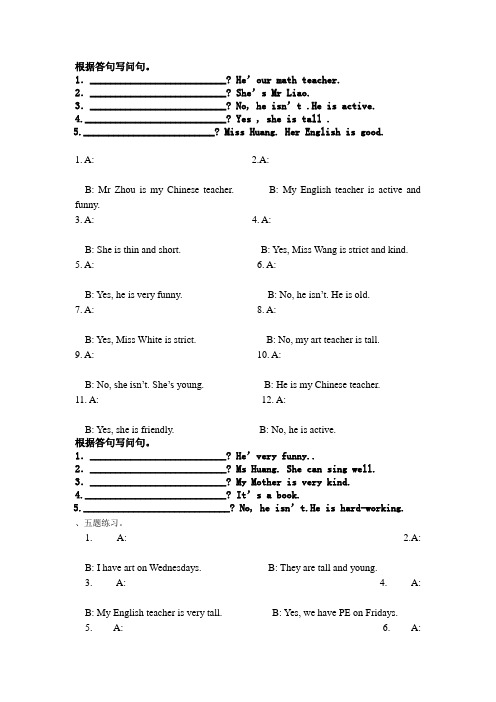
根据答句写问句。
1.___________________________? He’our math teacher.2.___________________________? Sh e’s Mr Liao.3.___________________________? No, he isn’t .He is active.4.____________________________? Yes , she is tall .5.__________________________? Miss Huang. Her English is good.1. A: __________________________2.A:______________________________B: Mr Zhou is my Chinese teacher. B: My English teacher is active and funny.3. A: ___________________________4. A:______________________________B: She is thin and short. B: Yes, Miss Wang is strict and kind. 5. A: ___________________________ 6. A:_____________________________B: Yes, he is very funny. B: No, he isn’t. He is old.7. A: ___________________________ 8. A:_____________________________B: Yes, Miss White is strict. B: No, my art teacher is tall.9. A: ___________________________ 10. A:_____________________________B: No, she isn’t. She’s young. B: He is my Chinese teacher.11. A: ___________________________ 12. A:_____________________________B: Yes, she is friendly. B: No, he is active.根据答句写问句。
小学语法-根据答语写问句

• 4. _____________________________________________ _________ • Yes, l like milk very much. • _____________________________________________ ________ • I’d like some tofu and pork for dinner. • _____________________________________________ ________ • I often have tofu and pork for lunch. • 7. _____________________________________________ ________ • I like tofu and pork. • 8. _____________________________________________ ________ • No, I am a doctor.
根据句意写句子
• • 1. ___________________________________? • Our math teacher is young and strict. • 2. ___________________________________ _______? • We have two new teachers. • 3. ___________________________________ __? • My English teacher is from Hunan. • 4. ___________________________________ ________? • No, our principle is tall.
有问有答的句子怎么写的
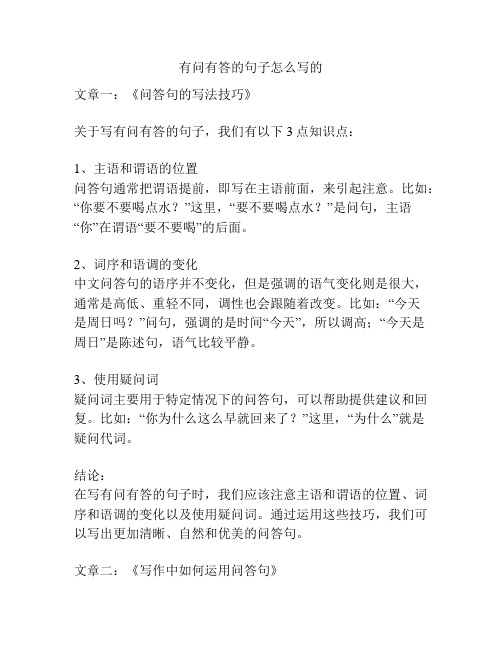
有问有答的句子怎么写的文章一:《问答句的写法技巧》关于写有问有答的句子,我们有以下3点知识点:1、主语和谓语的位置问答句通常把谓语提前,即写在主语前面,来引起注意。
比如:“你要不要喝点水?”这里,“要不要喝点水?”是问句,主语“你”在谓语“要不要喝”的后面。
2、词序和语调的变化中文问答句的语序并不变化,但是强调的语气变化则是很大,通常是高低、重轻不同,调性也会跟随着改变。
比如:“今天是周日吗?”问句,强调的是时间“今天”,所以调高;“今天是周日”是陈述句,语气比较平静。
3、使用疑问词疑问词主要用于特定情况下的问答句,可以帮助提供建议和回复。
比如:“你为什么这么早就回来了?”这里,“为什么”就是疑问代词。
结论:在写有问有答的句子时,我们应该注意主语和谓语的位置、词序和语调的变化以及使用疑问词。
通过运用这些技巧,我们可以写出更加清晰、自然和优美的问答句。
文章二:《写作中如何运用问答句》运用问答句是写作中常用的技巧,可以吸引读者的注意力、导入主题并清晰地表述观点。
以下是我们需要注意的三个知识点:1、短小简练问答句中用词应当简单明了,尽量避免冗长句子。
短句子也更符合口语化的语言风格,短小得力的问答句往往可以为文笔锦上添花。
2、灵活运用问答作者可以通过转化句子、反复重复等方式灵活地利用问答句,让其在文章中大显身手。
对于难以表述的观点或论点,问答句也可用来辅助阐释,使它们更加生动和形象。
3、借助问答句开启主题问答句可以为文章开头引入一个话题,并且可以让读者对文章内容感到好奇。
若要以问答句的形式开头,则应写得巧妙而有趣,从而引起读者的兴趣。
结论:在写作中运用问答句是必不可少的,我们可以通过注意短小简练、灵活运用问答以及借助问答句开启主题等方法,锦上添花,使文章更具感染力和可读性。
六年级英语根据答句写问句

一.根据答句写问句,如有图片,结合图片提示提问,让对话合理、通顺,并且与图片相符合。
1.A:Hello ,Jenny._____________________________________? I want to send a letter. B: It’s near the science museum.2.A:Good morning, Lisa.___________________________________________?B: I often come to school on foot.3.A:Summer holiday is coming.______________________________________?B: I’m going to take a trip with my parents.4.A:Hi, Bob.___________________________________________?B: My pen pal lives in the South Island.5.A:Hello. Joe._______________________________________?B: The cartoon is about a cat.6.A:I don’t feel well. I want to see a doctor.______________________________________? B: It’s near the park on Dongfang Street.7.A:Hi, Lisa. ___________________________________?B: Yes, it’s my bike. My father brought it for me.8.A:Good morning. __________________________________________?B: I’m going to see a film with my sister this evening.9.A:Hello, Bob. _________________________________________?B: I like doing kungfu and swimming.10.A:Hi, Joe.________________________________________?B: I’m going to be a scientist in the future.11.A:Hello, Jenny. I want buy to a book._________________________________?B: It’s next to the library.12.A:Good morning, Lisa. _________________________________________?B: My father goes to work by car.13.A:Hi, John. ________________________________________________?B: No, I’m going to play football. I’m going to do my homework tomorrow.14.A:Bob,_____________________________________________________?B: Yes, I do. I have twenty comic books.15.A:Wow! So many gifts._____________________________________________?B: I feel very happy.16.A:Good morning, Jenny. _________________________________________?B: No, there isn’t a restaurant near here.17.A:Excuse me,____________________________________________________?B: Turn right at the first crossing and you can see the library.18.A:Hello, John._________________________________________________?B: I’m going to the countryside this weekend.19.A:Hi, Bob. ____________________________________________________?B: I’m doing my homework now.20.A:Hello, Joe. ____________________________________________?B: No, my brother isn’t a pilot. He is a doctor.21.A:Hello, Jenny. _________________________________________?B: No, I don’t go by bike. I often go on foot.22.A:Hi, Lisa. _____________________________________________?B: No, I can’t go swimming today. Because I have a lot of homework to do.23.A:Good morning, John. I like singing. ____________________________________?B: No, I don’t like singing. But I like dancing.24.A:Your father is a pilot. _____________________________?B: He works near the sea.25.A:I have a fever.______________________________________?B: You should see a doctor.26.A:Hello, Jenny.____________________________________________?B: Take the No.57 bus over there. You can find the hospital on your left.27.A:Good morning, Lisa.__________________________________________?B: I’m going to the park with my parents.28.A:Hi, John. ______________________________________________?B: I’m writing an email to my new pen pal.29.A:Wow! Your mum is beautiful.______________________________________?B: My mother is a nurse.30.A:Good morning, Joe.______________________________________________?B:There are four people in my family.31.Mike: Hi, Sarah. _________________________________________?Sarah: No, I went to my uncle’s home. I played chess with my cousin.32.Zip: It’s time for holiday. _____________________________________________?Zoom: I am going to Xian by train. You know, taking a train is cheap.33.Waiter: Welcome. __________________________________?Jimmy: Oh. I’d like some rice, fish and cucumbers for lunch.34.Tom: Hello, Peter! _________________________________? Let’s go the post office.Peter: Sorry, I am cooking dinner for my mother.35.Terry: __________________________________________________?Su: Yes. And I cleaned the board, too.36.Mom: Amy, It’s time for dinner.___________________________ ?Amy: She is making a snowman outside. Amy’s sister 37.Tom: Really? You went to Guilin on the holiday. ____________________________?Mary: We flew there. It was fast.38.Su: Your brother’s birthday is in February. But _____________________________?John: February 9th.39.Amy: Hello, this is Amy. ___________________________________?Sarah’s mom: Please hold on. Sarah, there is a call for you.40.Teacher: Children, __________________________________________?Girls: We are going to the library. We like reading.41.Peter: Mike, you were not at the party last night. __________________________?Mike: I went to the hospital. I felt sick.42.Zip: __________________________________________every day? 浇花Coco: No, but my sister watered them yesterday.43.Jimmy: _________________________________________________?Kitty: Oh, my father often reads newspapers in the evening. He likes reading.44.Tim: ___________________________?Peter: No, winter is too cold. I like spring best.45.Amy: ______________________________________________? 弹钢琴Helen: No, Liu Yun likes drawing pictures.46. Amy:Look at the woman under the tree. She's my mother.Betty:________________________________________Amy:She likes cooking Chinese food.47. Peter:My aunt works in a hospital.Jill: ________________________________________Peter:Yes,she goes to work by subway.48.Tom:Look at the tall man. He's my uncle.Bob:________________________________________Tom:No,he doesn't. He likes playing football.49.Jack:Good afternoon,Mike.________________________________________ Mike:Good afternoon. I'm doing word puzzles.50.Lucy:Your pen pal is from Australia. ____________________________________ Lily: Yes, my pen pal often writes emails to me.。
根据答句写问句解题方法

…怎么样 星期几 什么日期 为何目的 …怎么样
多大 多少 多少 …怎么样 多远
问意见 问星期 问具体日期 问目的 问情况 问年龄 问数量
问价钱、不可数
问意见 问路程
以下口诀要牢记
1.问“谁”,用who; 2.问“地点哪里”,用where; 3.问“身体状况”或“方式”,用how;
一、把be情助动词这些词放在句子最前面 二、some改成any, 三、句号改成问号,其余照抄 四、注意人称的变化。
NIsoMM,rrMssGrGsrreGeeernneaeannsiEcsniaegnlsiccseihetnteecaaecchteear?.cher.
(英语老师)
一、把be情助动词这些词放在句子最前面
好(how)身体要防湿;麻鸡(much)
4.问“年龄”,用how old;不可谈价钱;十五之夜没什么(what) 5.问“可数数量”,用how many; 6.问“不可数数量”或“价钱”,用how much;
单词文 章记忆
01
根据答句 写问句
02
Click here to add your
04 title03
选词
填空
补充
对话
一、根据答句写问句
1. My Chinese teacher is strict but kind.
2. I often read books on the weekend.
3. No,I don't do housework on Saturdays.
2. What do you often do on the weekend?
根据答句写问句专练
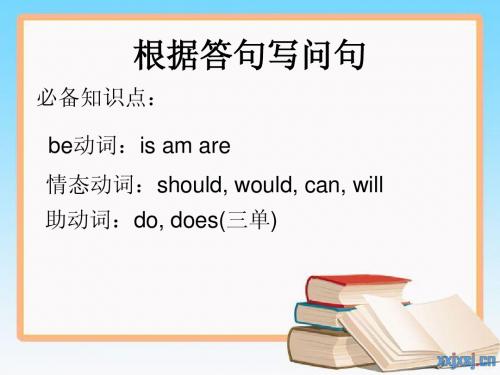
1.被遗弃的 “ s” on+星期s 复数名词s/es 三单人称+动词s/es 问“性格或外貌特征” 问“最喜欢的...” 问“某人是谁”
on Mondays some potatoes He/Mike likes
2. 放错位置的“时间”
时间一般在句尾
I have Chinese, maths, music on Tuesdays. My brother plays football on the weekend. I do homework after school/in the evening.
4. 答“课程”
问 “What do you have on +星期s?”
5. 答“动作” 问 “What do you do on +星期s?” “What do you do on the weekend?” 6. 答“想要的食物/饮料”
问“What would you/he/she/名字 like to eat/drink?”
人称代词
主格:I you he she it we
us
they
them
宾格:me you
him her it
主格用在句首;宾格用在句中或句尾。
名词:
可数
不可数: 肉类;液体 (不能加s/es. 永远为单数)
单数
可数:
a/an/is/one
复数 many/some/like/are/大于1的数量
单数变复数:加s/es
2.答句没Yes/no,问句为特殊疑问句
1. 答“性格,长相” 问 “What’s +人/名字+like?” What are you/they like? 2. 答“喜欢的食物或饮料” 问 “What’s your/his/her/名字’s favourite food/drink?” 3. 答“某人是谁” 问“Who’s +he/she/your+科任老师?”
六年级问答句答题方法

六年级问答句答题方法
六年级问答句答题方法可以参考以下几点:
理解题目背景:首先,你需要仔细阅读题目,确保你理解问题的背景和要求。
如果需要,你可以先用自己的语言简述问题,以帮助你更好地理解。
找出关键词:在问答句中,通常会有一些关键词或短语,这些词可能是问题的“抓手”,帮助你找到问题的核心。
例如,“从哪里看出来……”的题型中,你需要找到这个“哪里”,它通常会指向文章中的某个具体部分。
在文中寻找答案:一旦你找到了关键词,你可以在文章中寻找与这个关键词相关的语句或段落。
这些语句或段落通常会包含问题的答案。
记得把相关的语句先抄下来。
理解答案:在找到答案后,你需要理解这个答案的含义。
你可以试着用自己的语言解释这个答案,或者给这个答案换个说法,以确保你真正理解了它。
联系生活实际:在理解答案后,你可以试着联系自己的生活实际,看看这个答案是否与你的生活经验相符。
如果你有任何疑问或不同的看法,都可以写下来。
组织答案:最后,你需要组织你的答案。
你可以按照“因为……所以……”的逻辑关系来组织你的答案,这样可以让你的答案更加清晰明了。
以上就是六年级问答句答题的基本方法,希望对你有所帮助。
当然,不同的题目可能会有不同的要求和技巧,你需要根据实际情况灵活应对。
六年级下册英语根据答句写问句总复习

六年级下册英语根据答句写问句总复习姓名__________班别___________1.___________________________________? 1 2They are having a picnic.2.___________________________________?No. I read books last night.3.___________________________________? 34.I’m going to fly kites next weekend.4.___________________________________?She is answering the phone.5.___________________________________? 5 6Yes, they are going this Sunday.6.___________________________________?Zhang Peng swam in the sea on May Day.7.___________________________________? 7 8I like playing the piano.8.___________________________________?No, he often washes clothes in the evening.9.___________________________________?I am a student. 1010.T om: ___________________________________?Peter: I like taking a picture.11.___________________________________? 11No, they cleaned the room yesterday. Sarah 5月1日MikePeter12. ___________________________________? 12.He usually goes to school by bike. 13. ___________________________________? 13 14Yes, Chen Jie is catching butterflies.14. ___________________________________?They are drinking water by the river.15. ___________________________________? 15 16It ’s spring now.16. ___________________________________?Because I like skating in winter.17. ___________________________________? 17 18My sister likes playing the violin.18. ___________________________________?It ’s 2:05 now.19. ___________________________________? 19Yes, he likes fishing.20. ___________________________________?There are five people in my family.21. ___________________________________? 21 22He is going to go skiing this winter holiday.22. ___________________________________?They usually play chess on the weekend.23. ___________________________________? 23 I can do the dishes.AlexJohn24.___________________________________? 14.No, I drew pictures last night.25.___________________________________? 25 26The girl is sleeping.26.___________________________________?It’s rainy today.Sarah27.___________________________________?27 28Yes, she can write a letter.28.___________________________________?Yes, I am helpful at home.29.___________________________________? 29 30They are going to go hiking next Saturday.30.___________________________________?They are in the supermarket.31.___________________________________? 31It’s on the wall.32.___________________________________? 32I am washing the clothes.33.___________________________________?No, my sister can’t write a report. 33 34 34.___________________________________?We climbed mountains last weekend.35.___________________________________?There are two tigers in the picture.36. ___________________________________? 36.He is going to write an e-mail this evening.37. ___________________________________? 37 38There are three traffic lights in our country.38. ___________________________________?They are going to the cinema.39. ___________________________________? 39 40No, my brother likes reading books.40. ___________________________________?We are going to visit my grandparents next Saturday.41. ___________________________________? 41 42I cook dinner for my family every day.42. ___________________________________?Yes, there are many books on the shelf.43. ___________________________________? 43 44She is watching insects.44. ___________________________________?The rain comes from the clouds.45. ___________________________________? 45 46Nick is bored.46. ___________________________________?Yes, the phone is on the desk.47. ___________________________________? 47There are two end tables in my bedroom.John Chen Jie。
根据答句写问句三年级暑假生活

根据答句写问句三年级暑假生活
(原创版)
目录
1.三年级暑假生活的概述
2.答句的种类与应用
3.写问句的技巧与实践
4.答句与问句的互动关系
5.结论:通过答句写问句,丰富暑假生活
正文
【提纲】详解三年级暑假生活
1.三年级暑假生活的概述
暑假,是孩子们最期待的时光。
对于三年级的小学生来说,这个暑假更是意义非凡。
一方面,他们即将结束小学阶段的低年级,迈入更高年级的学习;另一方面,他们还有更多的时间可以自由安排,尽情享受暑假生活。
2.答句的种类与应用
在暑假生活中,孩子们会遇到各种各样的情景,如旅游、游泳、学习新技能等。
这些情景中,答句是不可或缺的沟通工具。
答句可以分为设问句、反问句、疑问句等,不同类型的答句可以应对不同的情景。
3.写问句的技巧与实践
写问句也是一门艺术,好的问句可以引导对话,增进沟通。
在暑假生活中,孩子们可以通过写问句来记录自己的生活点滴。
例如,孩子们可以写:“今天我们去了哪里玩?”、“游泳要注意什么?”等。
通过提问,孩子们可以更加关注身边的事物,丰富暑假生活。
4.答句与问句的互动关系
答句与问句是相辅相成的。
在暑假生活中,孩子们在提问的同时,也会遇到别人的提问。
学会回答问题,不仅可以帮助孩子们更好地应对生活场景,还可以提高他们的沟通能力。
5.结论:通过答句写问句,丰富暑假生活
总的来说,通过答句写问句,可以帮助三年级的孩子们更加关注暑假生活,提高他们的沟通能力。
高效解答疑问的问答话术

高效解答疑问的问答话术在生活和工作中,我们不可避免地会遇到各种各样的问题和疑问。
有时,我们需要向他人请教,有时则需要解答他人的问题。
无论是哪一方面的角色,都希望能够高效地解答疑问,达到双方的理解和满意。
下面,我将分享一些高效解答疑问的问答话术,帮助大家更好地沟通和交流。
1. 肯定和理解对方的问题:当有人向你提出问题时,首先要给予肯定并理解对方的疑问。
这可以通过回应对方的问题并使用称赞和赞美的话语来实现,例如:“这是一个很好的问题,让我来解答一下。
”或者“非常感谢你提出这个问题,我会尽力帮助你”。
这样的反应不仅可以表达对对方问题的尊重,也能够让对方感到被重视。
2. 简明扼要地回答问题:在回答问题时,我们要尽量避免使用冗长的解释和复杂的术语。
要以简明扼要的语言回答问题,并提供直接的答案。
避免罗嗦和绕圈子,这样可以更快地解答对方的疑问,并让对方更容易理解。
3. 用具体的事例或实例解释问题:当遇到一些抽象或复杂的问题时,我们可以通过提供具体的事例或实例来帮助对方更好地理解。
通过实例可以将抽象的概念具体化,让对方更容易理解和接受解答。
例如,“举个例子,如果你的手机电量过低,你可以尝试将手机连接充电器充电。
”这样的回答可以帮助对方更好地理解解决问题的方法。
4. 识别背后的问题:有时候对方的问题可能并不是表面上看起来的那么简单,我们需要识别问题背后的真正需求并解决它。
这需要我们在回答问题时,主动与对方互动,询问进一步的细节,以全面了解问题的背景和目的。
例如:“你提到你无法完成这个任务,请问具体是什么原因阻碍了你的进展?我能帮助你解决哪一方面的问题?”通过进一步的了解,我们可以更全面地解答对方的问题,并提供更有针对性的帮助。
5. 给予合理解答:在回答问题时,我们要确保所给予的解答合理、准确,并符合对方的期望。
在需要推理、判断或分析的问题中,我们要尽可能地提供有理有据的答案,避免主观臆断或主观观点。
同时,也要尊重对方的意见和观点,在与对方意见相悖时,友好地说明自己的立场和解释,并尽量达成共识。
补全对话答题技巧

Thank you very much! Not at all. 不用谢.
• 道歉类: Sorry. I am sorry for what I said/did • 建议类: You had better do----What about doing… ? • How about doing… ? Why not do… ?同义句why don’t • you do… …? • Let’s do … OK ? Would you like some … ? • Shall we do… ? • 支持赞同上面建议答语:That’ s a good idea . \That sounds good .
5.谈论将要去做的一些事情:(例如准备去旅游、 去度假、去购物、去探亲等) • 1.--- What are you going to do ? • ---I have no idea. What about you? • 2. Where are you going ? • 3. How will you go/get there ? • 4. Who will you go with ? • 5. When will you leave?/When are you going? • 6. How long will you stay there? • 7. When and where shall we meet? • 8. Wish you have a good time/trip.
补全对话答题技巧
答题理念:问什么答什么,答什么问什么。
•
•
•
ቤተ መጻሕፍቲ ባይዱ
• • • • •
1.本题分析: 五个句子,分值10分,这是一道“实惠”题,比起作文六十个单词15分简直太划 算了,可是就这样的题好多学生难以拿分,甚至放弃,实在可惜。并且有上下句的提 示和语言环境,如果能够把握此题,是很好拿分的。只要句子符合上下文环境,语法 正确,即可拿分。 2 .必有问句:这是本题的最大特点,原因很简单。两个人说话,各说各的,互不相问, 对话是很难进行下去的。一般会有2-4个问句,个别篇甚至五句全是问句。这个特点对 于写出正确的句子极其有用。 3.问答相随:就是“问什么答什么,答什么问什么”,在答句中找出问句的依据,在问句 中找出答句的内容或方向。比如:A:--------------?B:There are three people in my family. 那么根据下句答语,上句问题应该是问家有多少人的-How many people are there in you r family? 4.紧接话茬:没有问答的句子好似比问答句难了一些,实则不然,因为这样的句子更 有灵活性,发挥的空间更大,标准答案往往有十几个,甚至更多。只要符合语境,语 法正确即可得分。 5.积累话题:中考的补全对话的话题是有范围的,只要学生对这些对话熟悉,看到一 篇对话,就能够快速找到对应的话题,然后写出最标准的句子。 6.能套则套:如果能找出现成的句子,就不要去自己造句子。标准的句子是最容易得分 的,造出的句子一是可能有语法错误,而是可能生硬致使老师判错,不给分。 7.可用短句:有些句子是在想不出怎么写的,或者没有把握把完整的句子写对,就可 以用一些省略句表达,一般是不会扣分的,比如:Why? What? How many? How much? 等句子。 8.迎合试题:有些同学知道句子该怎么写,可是没有选择最常用的句子而导致失分。 大部分题目的意思是非常明确的,它就是要求你写出某个句子,这是就要迎合试题, 准确得分。
一般疑问句,否定句以及根据答句写问句的答题方法
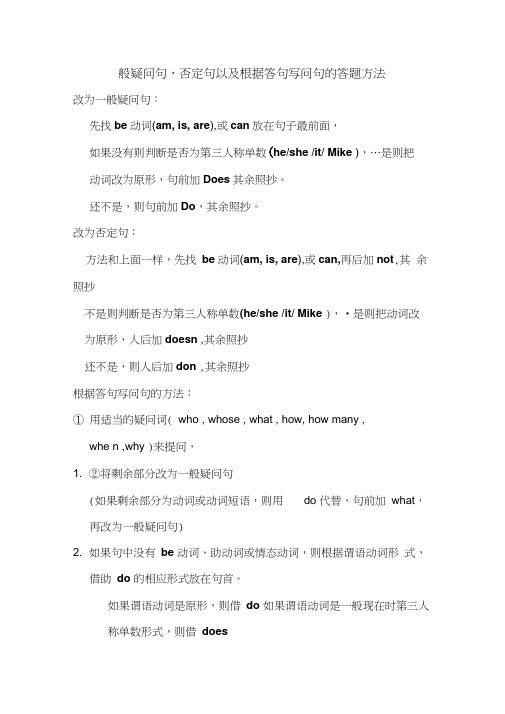
般疑问句,否定句以及根据答句写问句的答题方法改为一般疑问句:先找be动词(am, is, are),或can放在句子最前面,如果没有则判断是否为第三人称单数(he/she /it/ Mike ),…是则把动词改为原形,句前加Does其余照抄。
还不是,则句前加Do,其余照抄。
改为否定句:方法和上面一样,先找be动词(am, is, are),或can,再后加not,其余照抄不是则判断是否为第三人称单数(he/she /it/ Mike ),•是则把动词改为原形,人后加doesn ,其余照抄还不是,则人后加don ,其余照抄根据答句写问句的方法:① 用适当的疑问词( who , whose , what , how, how many ,whe n ,why )来提问,1. ②将剩余部分改为一般疑问句(如果剩余部分为动词或动词短语,则用do 代替,句前加what,再改为一般疑问句)2. 如果句中没有be 动词、助动词或情态动词,则根据谓语动词形式,借助do 的相应形式放在句首。
如果谓语动词是原形,则借do 如果谓语动词是一般现在时第三人称单数形式,则借does如果陈述句中有实义动词have,且表示有”时,借助动词do、doese.g I have some friends in America. —Do you have any friends in America?需要注意的是:借does 或did 后,原句的谓语动词要变回原形。
e.g Bill gets up at 6:30 every day.—Does bill gets up at 6:30 every day?The students saw a film yesterday.—Did the students see a film yesterday?注意:陈述句变一般疑问句注意的事项:如果陈述句中有第一人称,则变问句时要变为第二人称。
根据答句写问句答题技巧
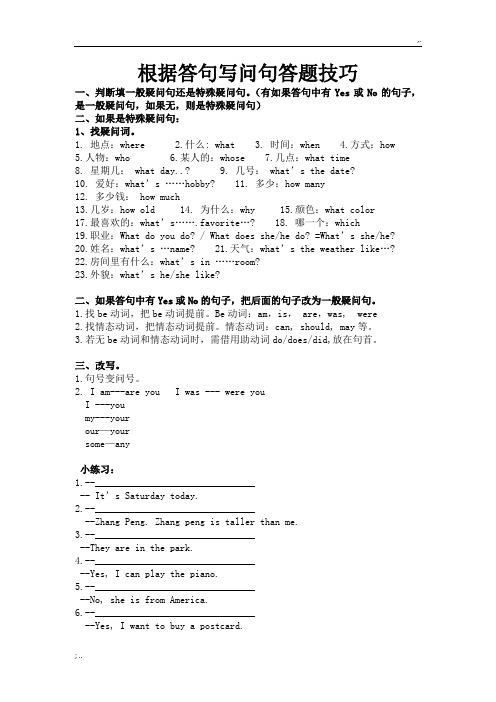
,.; .. 根据答句写问句答题技巧一、判断填一般疑问句还是特殊疑问句。
(有如果答句中有Yes或No的句子,是一般疑问句,如果无,则是特殊疑问句)二、如果是特殊疑问句:1、找疑问词。
1. 地点:where2.什么: what3. 时间:when4.方式:how5.人物:who6.某人的:whose7.几点:what time8. 星期几: what day..? 9. 几号: what’s the date?10. 爱好:what’s ……hobby? 11. 多少:how many12. 多少钱: how much13.几岁:how old 14. 为什么:why 15.颜色:what color17.最喜欢的:what’s…….favorite…? 18. 哪一个:which19.职业:What do you do? / What does she/he do? =What’s she/he?20.姓名:what’s …name? 21.天气:what’s the weather like…?22.房间里有什么:what’s in ……room?23.外貌:what’s he/she like?二、如果答句中有Yes或No的句子,把后面的句子改为一般疑问句。
1.找be动词,把be动词提前。
Be动词:am,is, are,was, were2.找情态动词,把情态动词提前。
情态动词:can, should, may等。
3.若无be动词和情态动词时,需借用助动词do/does/did,放在句首。
三、改写。
1.句号变问号。
2. I am---are you I was --- were youI ---youmy---yourour—yoursome—any小练习:1.--________________________________-- It’s Saturday today.2.--________________________________--Zhang Peng. Zhang peng is taller than me.3.--________________________________--They are in the park.4.--________________________________--Yes, I can play the piano.5.--________________________________--No, she is from America.6.--________________________________--Yes, I want to buy a postcard.。
根据答句写问句
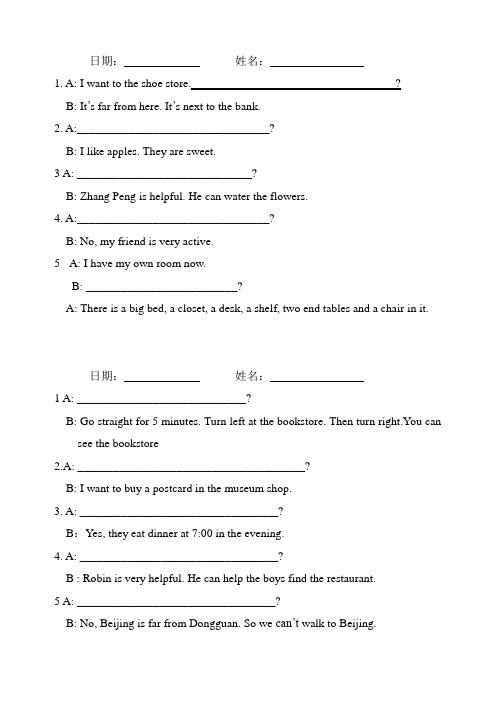
1. A: I want to the shoe store. ?B: It’s far from here. It’s next to the bank.2. A:_________________________________?B: I like apples. They are sweet.3 A: ______________________________?B: Zhang Peng is helpful. He can water the flowers.4. A:_________________________________?B: No, my friend is very active.5A: I have my own room now.B: __________________________?A: There is a big bed, a closet, a desk, a shelf, two end tables and a chair in it.日期:姓名:1 A: _____________________________?B: Go straight for 5 minutes. Turn left at the bookstore. Then turn right.You can see the bookstore2.A: _______________________________________?B: I want to buy a postcard in the museum shop.3. A: __________________________________?B:Yes, they eat dinner at 7:00 in the evening.4. A: __________________________________?B : Robin is very helpful. He can help the boys find the restaurant.5 A: __________________________________?B: No, Beijing is far from Dongguan. So we can’t walk to Beijing.1. A: __________________________________? B:Mike eats dinner at 7:00 in the evening.2. A: ______________________________?B: Yes, he is counting insects.3. A:__________________________________?B: The cinema is next to the hospital.4. A:__________________________________?B: Yes, there is a science museum near the park.5. A:__________________________________?B: You can take the No.1 bus to the bookstore.日期:姓名:1. A: __________________________________? B:Mike eats dinner at 7:00 in the evening.2. A: ______________________________?B: Yes, he is counting insects.3. A:__________________________________?B: The cinema is next to the hospital.4. A:__________________________________?B: Yes, there is a science museum near the park.5. A:__________________________________?B: You can take the No.1 bus to the bookstore.1. A: (下棋)B: No, my father and I often play sports on the weekend.2. A:B: My home is far. I usually come to the park by bus.3. A: Today is Tuesday.B: We often have pork and cabbage for lunch.4. A: (抓蝴蝶)B: No. My sister is picking up leaves.5. A:B: You can go straight on Heping Rd. Then turn right at the prk. The hospital is in front of you.日期:姓名:1.A:B: No, you can’t go to Guangzhou by bike. It’s too far.2.A:B: Today is Sept. 20th . It’s my birthday.3.A: Look there.B: The baby kangaroos are jumping with the mother kangaroos.4.A: I know you often go to the park on the weekend.B: I walk there. It’s near my home.5.A:B: Yes, there are many tall buildings in the big cities.1. A:_____________________________________B: No, the post office is far from my home.2. A:________________________________________B: I can get to the park by subway. It’s fast.3.A:B: Look ! It's near the bank.4. A:B: Sure. First,turn right at the Xinhua Bookstore.You can see the People’s Park.5A:B: I like spring. The weather is warm and sunny.日期:姓名:1.A:B: No, we can’t go at the red light. We must stop and wait.2.A:B: There are three lights in the traffic lights.3.A:B: Amy goes to the park on Sundays.4. A:B: Amy often goes to Dongguan by bike.5. A:B: Our Chinese teacher is funny and kind. We all like him.1.A:_____________________________________B: Yes,Chen Jie and Sarah often go to the park by subway.2.A:B: They usually play sports on Sundays.3.A:B: No, my home is near. So I go to school by bus.4.A:B: We should stop at a red light.5.A:________________________________________________B: Go straight for 3 minutes. Then turn left at the cinema. The bookstore is next to the cinema.日期:姓名:1.A:_______________________________________________B: My mother goes to work by car.2.A:_______________________________________________B: My home is near. I come to school on foot.3.A:_________________________________________________B: Yes, my parents go to work by car.4.A:__________________________________________________B: There are a bed, a shelf and an end table in my room.5.A: Dad, ____________________________________________B: We can take the No.1 bus to Changping.日期:姓名:1.A: ___________________________________________________B: The students go to school by ferry.2.A: ___________________________________________________B: I am going to see a film this weekend.3.A: _____________________________________________________B: Yes, Amy is going to have an art lesson tommorw.4.A: _____________________________________________________B: The science museum is not far. It’s next to the park.5.A: ______________________________________________________B: I want to buy a pair of shoes in the shoe store.日期:姓名:1.A: ___________________________________________B: I am going to buy a dictionary next Sunday. 星期天2.A: ____________________________________________B: Sure. First walk straight for 1 miunte, then turn left. You can see the cinema.3. A: ______________________________________________B: I often take a bus to school. Sometimes I ride a bike there.4.A: __________________________________________________B: Yes, John is going to the bookstore this afternoon.5.A: _________________________________________________B: We are going to the zoo next weekend. 动物园日期:姓名:1.A:B: We should slow down and stop at a yellow light.2. A:B: Mike usually goes to Guangzhou by train.3. A:B: No, you can drive on the right in China.4. A: (看望爷爷奶奶) B: No, my family and I are going to the park tomorrow.5.A:B: Tom often does housework and reads books on Sundays.日期:姓名:1.A:B: Today is Oct. 1st . It’s National Day.2. A:B: Jack and John are going to see a film about the butterflies this evening.3. A: Hey!You often go to the library on Saturdays.B: Take the No.1 bus. It’s cheap and fast.4. A: May’s mother is in the pet shop.B: Yes, she’s going to buy a cat for May.5. A:B: We will go to the zoo by car next weekend.。
根据答句写问句方法

一般疑问句,及根据答句写问句的答题方法改为一般疑问句:1) 先看句子中有没有be动词(am, is, are),过去式(was ,were)或can,有的把它放在句子最前面,如:They’re happy.→Are they happy?2) 但是第一人称(I,we)和第二人称(you,你、你们)之间的转变要注意:I am a boy.→ Are you a boy? We are busy.→Are you busy? I was happy.→ Were you happy? We were happy .→Were you happy? 3)如果句中没有be动词(is,am,are/ was,were),须借助动词do,does(过去式did) A、先判断句子是否为过去式,、是的则把did改为原形。
eg: John climbed moutains yesterday.→Did John climb mountains yesterday?B、若非过去式,再判断是否为第三人称单数(he/she/it/Mike…),是则把单词改为原形,句前借Dose.eg: Amy often climbs mountains on the weekend. →Dose Amy often climb mountains on the weekend?C、如果都不是以上的形式,则句前借Do.如人称(I/we/you/they/Amy and Tom…) eg: Amy and Jack get up at 7:00 . → Do Amy and Jack get up at 7:00? 根据答句写问句的方法:①用适当的疑问词(who , whose , what , how, how many , when ,why)来提问,②将剩余部分改为一般疑问句(如果剩余部分为动词或动词短语,则用do,does,did代替,改为一般疑问句,句前用相应的疑问词。
- 1、下载文档前请自行甄别文档内容的完整性,平台不提供额外的编辑、内容补充、找答案等附加服务。
- 2、"仅部分预览"的文档,不可在线预览部分如存在完整性等问题,可反馈申请退款(可完整预览的文档不适用该条件!)。
- 3、如文档侵犯您的权益,请联系客服反馈,我们会尽快为您处理(人工客服工作时间:9:00-18:30)。
根据答句写问句答题技巧
一、判断填一般疑问句还是特殊疑问句。
(有如果答句中有Yes或No的句子,是一般疑问句,如果无,则是特殊疑问句)
二、如果是特殊疑问句:
1、找疑问词。
1. 地点:where
2.什么: what
3. 时间:when
4.方式:how
5.人物:who
6.某人的:whose
7.几点:what time
8. 星期几: what day..? 9. 几号: what’s the date?
10. 爱好:what’s ……hobby? 11. 多少:how many
12. 多少钱: how much
13.几岁:how old 14. 为什么:why 15.颜色:what color
17.最喜欢的:what’s…….favorite…? 18. 哪一个:which
19.职业:What do you do? / What does she/he do? =What’s she/he?
20.姓名:what’s …name? 21.天气:what’s the weather like…?
22.房间里有什么:what’s in ……room?
23.外貌:what’s he/she like?
二、如果答句中有Yes或No的句子,把后面的句子改为一般疑问句。
1.找be动词,把be动词提前。
Be动词:am,is, are,was, were
2.找情态动词,把情态动词提前。
情态动词:can, should, may等。
3.若无be动词和情态动词时,需借用助动词do/does/did,放在句首。
三、改写。
1.句号变问号。
2. I am---are you I was --- were you
I ---you
my---your
our—your
some—any
小练习:
1.--________________________________
-- It’s Saturday today.
2.--________________________________
--Zhang Peng. Zhang peng is taller than me.
3.--________________________________
--They are in the park.
4.--________________________________
--Yes, I can play the piano.
5.--________________________________
--No, she is from America.
6.--________________________________
--Yes, I want to buy a postcard.。
